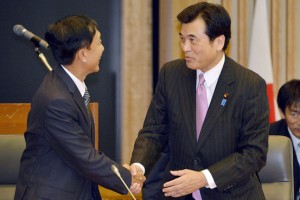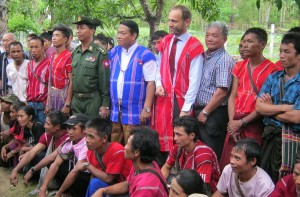Aid and Development (20 found)
World Bank Breaches Own Policy and Ignores Civil Society’s Request for Postponement of Project
On 1 November, the World Bank’s Board of Directors decided to go ahead with a US$80 million Community Driven DevelopmentProject, despite Myanmar civil society organization’s official request to postpone the project until the World Bank holds […]
• •New Lending Must Address Challenges on Burma’s Road to Development
 On 11 October, Japan announced that it would be resuming loans to Burma. It also hinted that it will assist the heavily indebted country in clearing its arrears and establishing good financial standing with international financial institutions, such as the World Bank and the Asian Development Bank.
On 11 October, Japan announced that it would be resuming loans to Burma. It also hinted that it will assist the heavily indebted country in clearing its arrears and establishing good financial standing with international financial institutions, such as the World Bank and the Asian Development Bank.
Japan will be forgiving US$3.7 billion or about 60% of the total $6 billion debt Burma owes; it is also planning to use bridge loans by Japanese banks to help clear Burma’s $900 million of arrears with the World Bank and the Asian Development Bank. Japanese Finance Minister Koriki Jojima stated, “Japan is planning to resume its full program in Myanmar with yen loans to help support Myanmar’s sustainable economic development…at the earliest possible timing next year.” He further explained that Japan’s development priorities in Burma would focus specifically in the areas of electricity and road rehabilitation, rural development and improvement of port facilities.
At this moment in time, Burma’s re-entry into the world economy, specifically the ability to take loans from institutions such as the World Bank, the Asian Development Bank and Japan itself, carries great risk. The type of projects to be funded, the rate of investment, the sectors in which investment will take place, the presence of monitoring mechanisms, and the decision-making process are just some of the factors that will determine the long-term outcome of international financial support […]
Burma Activists Say Funding Initiatives Could Undermine Peace Process
Burma activists say international funds established to encourage peace in ethnic rebel areas risk undermining the process. Critics say the Norway and World Bank-led “peace funds” are prioritizing development instead of lasting political solutions. Norway’s ambassador refutes that notion and says their whole point is a lasting peace.
The aid plans were launched earlier this year by Norway, the World Bank, European Union, United Kingdom, United Nations and Australia […]
•LAND NOT FOR SALE!: Letter of Global Solidarity against Land Grabs in Burma/Myanmar
The current reforms in Burma/Myanmar are worsening land grabs in the country. Since the mid-2000s there has been a spike in land grabs, especially leading up to the 2010 national elections. Military and government authorities have been granting large-scale land concessions to well-connected Burmese companies. Farmers’ protests against land grabs have drawn recent public attention to many high profile cases, such as Yuzana’s Hukawng Valley cassava concession, the Dawei SEZ in Tanintharyi Region near the Thai border, Zaygaba’s industrial development zone outside Yangon, and the current Monywa copper mine expansion in Sagaing Division, among many others […]
• • •World Bank returns to Burma amid criticism
After leaving over suspended debt repayment in the late 1980s, the World Bank officially returned to Burma, also known as Myanmar, in early August. It signed off $85 million in grants, but no loans will be approved until the $400 million Burma still owes to the Bank are cleared. Concerns remain that the Bank is failing to engage constructively and transparently with civil society […]
• • •World Bank grant could ‘exacerbate’ problems in border regions
Civil society groups have urged the World Bank to exercise caution before pressing ahead with their plans to pump $85 million into community projects in Burma’s conflict-torn border regions or risk “exacerbating” local problems.
Campaigners have criticised the Bank for claiming that locals will be able to “decide whether to invest in schools, roads, water or other projects” without disclosing details of their consultation plans, transparency provisions and whether they have conducted a conflict-assessment […]
•Burma Peace Funds Must Do No Harm
 By Paul Sein Twa
By Paul Sein Twa
In the past few months, various media reports have quoted some concerns and opinions of KESAN regarding the ongoing peace process in Burma. This statement clarifies and expands upon these issues.
Our perspective on the peace process and peace funds
Sustainable peace is the long-term vision of Karen people. That vision incorporates rule of law, the protection of human rights, democratic governance, security of livelihood and equitable access to natural resources and essential services. We are not there yet.
Peace funds can be an important tool for building a culture of peace in Burma. Well managed peace funds can serve as positive instruments to advance shared multi-ethnic and government agendas for peace. However, peace funds must contribute to addressing deep rooted and structural obstacles to realizing peace in the country and strengthen community decision making processes to identify the priorities of ethnic people. The effective management of peace funds includes maximum transparency, support for a shared framework for peace, inclusive and meaningful consultation with a wide-range of non-state actors, multi-party dialogues and clear monitoring and accountability mechanisms. What we have witnessed so far is that the current peace fund process falls short of these good practices – and standards […]
South Korean Corporate and Government Should Not Exploit Burma’s Liberal Movement
Recently the movements such as nomination Aung San Suu Kyi, in Burma election have shown positive progressive movement of democratization in Burma. However, even after the official liberalization, it is still plausible to say that Burma is still being controlled […]
• • •IFIs must “engage with the Burmese people”
Over 20 civil society groups from Burma, also known as Myanmar, have written to the heads of the IMF and World Bank requesting that the IFIs involve grass roots actors in their newly revived activities in the country and that their operational policies “guarantee maximum transparency, accountability, social inclusiveness and safeguards”. International NGO Human Rights Watch has also written to Bank president Robert Zoellick calling on the Bank to “actively engage with the Burmese people” and ensure that “no one who engages with the Bank shall face reprisals” […]
• • •Japan Should Investigate Abuses at Burma Hydropower Project before Considering New Support
Burma Rivers Network (BRN) together with the Karenni Development Research Group (KDRG), representing dam-affected communities in Burma, urges the Japanese Government to investigate abuses linked to Lawpita (Baluchaung) No. 2 hydropower plant […]
• • •








 All posts
All posts